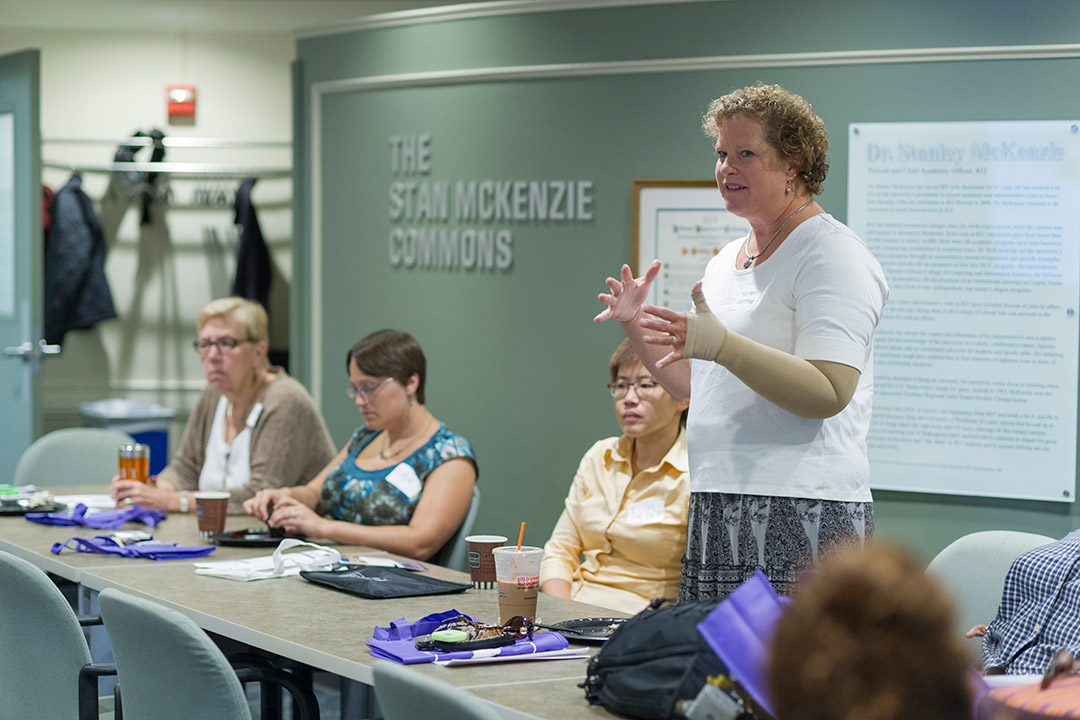Michigan Players presents workshops about supporting students facing mental health issues
Interactive sessions will highlight scenarios encountered by faculty and solutions to assisting students
Advance RIT has focused on improving the academic and professional environment for women in STEM programs. Over the past few years, the group has presented a wide range of programs for all campus faculty on topics such as addressing unconscious bias and continues with programming this semester about supporting students with mental health issues.
AdvanceRIT will host the Michigan Players for a workshop and interactive program about addressing the role faculty can play in influencing how mental health issues can be recognized and addressed.
Distress Signals: Supporting Students Facing Mental Health Challenges, takes place on Wednesday, March 25, and Thursday, March 26, at the CSD Student Development Center in RIT’s National Technical Institute for the Deaf, Rooms 1300-1310. Four separate (and identical) workshops are scheduled over the two days:
- 9:30 a.m. to noon March 25
- 1:30 to 4 p.m. March 25
- 9:30 a.m. to noon March 26
- 1:30 to 4 p.m. March 26
Participants can register online.
Refreshments will be provided during the presentations. Interpreting services will be provided through the Department of Access Services.
“We are hosting this important workshop to build on the university’s support of our students’ mental health and well-being,” said RIT Provost and Senior Vice President for Academic Affairs Ellen Granberg. “Many faculty, staff and administrators are looking for opportunities to better support our students in these areas, and the Michigan Players event is a great opportunity to think about how we can do that and to build a network of care and concern across campus.”
Sessions will include current information about trends in collegiate-student mental health issues, campus resources available, and information about identifying principles to help shape better interactions with students in distress. Built around two scenarios that present situations and dynamics teachers commonly encounter with students, the Michigan Players will guide participants to better shape awareness and interactions.
In 2018-19, the provost along with RIT President David Munson and Sandra Johnson, vice president of Student Affairs, initiated a campus-wide task force charged with conducting an overarching review of programs, services and educational efforts as they pertain to prevention and early intervention strategies to assist students. The group produced a comprehensive report with recommendations for enhancing resources, educational efforts and interventions.
The Michigan Players have performed at RIT on several occasions. The troupe performs common scenarios about faculty dynamics and academic experiences such as unconscious bias in promotion and tenure decisions, and navigating department politics. They also interact with audience members about perspectives on issues, how to communicate effectively within these settings and how to address behaviors and patterns of interaction that might negatively affect colleagues.
Established in 2000, the Michigan Players troupe is based in the University of Michigan’s Center for Research on Learning and Teaching. When the university received its NSF ADVANCE Institutional Transformation grant, it was one of several initiatives developed by the grant team and the center to engage faculty in discussions about recruiting and retaining female faculty in STEM programs in higher education. All members of the troupe are professionals with theater training and familiarity with academia.
AdvanceRIT is a long-term, multi-faceted project designed to increase and advance women faculty in STEM disciplines at RIT. Funded through a $3.4 million National Science Foundation Institutional Transformation ADVANCE grant, with additional support provided by the university, this research-based project includes enhancements to faculty development programming, refinements to policies, as well as examines the challenges experienced by women faculty of color and deaf and hard-of-hearing faculty, adapting interventions to address the needs of these populations.
This session is co-sponsored by RIT’s Offices of the President, Provost, Faculty Affairs, Faculty Career Development and the university’s Divisions of Student Affairs and Diversity and Inclusion.
